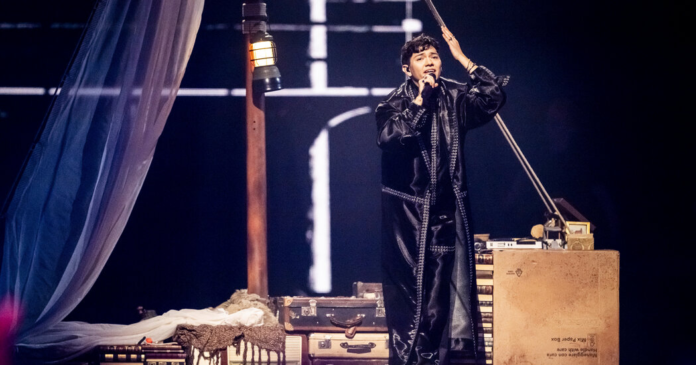Eurovision 2025
Advertisement
Supported by
Austria’s entrant, JJ, took the prize after a tense count that was neck-and-neck until the last votes were revealed.
Alex Marshall
Reporting from the St. Jakobshalle arena in Basel, Switzerland
Austria narrowly edged out Israel to win the Eurovision Song Contest after a tense vote count on Saturday night in which the lead switched repeatedly and the victor became clear only at the last moment.
Israel received the most points in the public vote, which accounts for half of the overall tally. Last year, the competition was overshadowed by protests over Israel’s involvement because of the country’s military campaign in Gaza.
Austria was represented this year by JJ, a classically trained singer, who performed “Wasted Love,” a dramatic song about heartbreak. He received 436 points to Israel’s 357.
Sweden, the pre-event favorite, came fourth.
Austria last won the competition in 2014, when Conchita Wurst, a bearded drag queen, triumphed with “Rise Like a Phoenix.”
JJ, a 24-year-old whose real name is Johannes Pietsch, is a countertenor, meaning that his vocal range most closely matches that of a female mezzo-soprano. He sings in the choir at the Opera School of the Vienna State Opera, and in recent months has appeared onstage in the company’s productions of Mozart’s “The Magic Flute” and Benjamin Britten’s “Billy Budd.”
Accepting the Eurovision winner’s trophy, a tearful JJ thanked the voters and called on them to “spread more love” in the world.
Eurovision’s four-hour final at the St. Jakobshalle arena in Basel, Switzerland, featured all the surreal and spectacular sights that music fans have come to expect from the competition, including scantily clad dancers and, at one point, a singer riding on a giant gold microphone stand that was suspended from the ceiling and spurting flames. Some 6,500 fans cheered in the arena throughout.
Last year’s competition, held in Malmo, Sweden, had an altogether different atmosphere. The lead-up to the final had been tense after some fans, and even some performers in the competition, protested Israel’s presence there because of its actions in the war in Gaza. Some audience members in the arena for the event booed loudly when Israel’s contestant, Eden Golan, performed, though others cheered.
This year, Israel was represented by Yuval Raphael, a survivor of the Hamas-led October 2023 attacks on southern Israel. During her performance at the Eurovision final, only a handful of boos and whistles were audible in the arena.
Before the final, many Eurovision fans had speculated that Celine Dion, the Canadian singer, would make an appearance onstage. Dion won Eurovision in 1988, representing Switzerland with “Ne Partez Pas Sans Moi” (“Don’t Leave Without Me”), and fans had hoped that she would reprise that track in Basel, even though she has barely appeared in public since 2022, when she announced that she had a rare neurological disorder known as stiff person syndrome. In the end, Dion was absent from Saturday’s event.
JJ, who spent most of his childhood in Dubai, started singing classically at age 15 when he moved to Austria. His father, noting JJ’s high singing voice, asked him to try out the “Queen of the Night” aria from “The Magic Flute,” a piece at the extreme end of that range, JJ recalled in a recent interview. He began watching YouTube videos of performances by Maria Callas and Montserrat Caballé and imitating those renowned sopranos, he said.
JJ said that he hoped his performance would “awaken interest in classical music” among Eurovision’s viewers.
After the winning the trophy, he sang “Wasted Love” a second time during the final, and finished with a piercing “high C.” Then, he burst into tears.
Alex Marshall is a Times reporter covering European culture. He is based in London.
Advertisement
